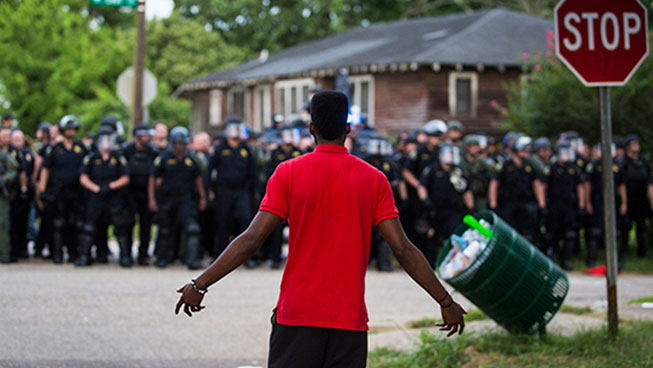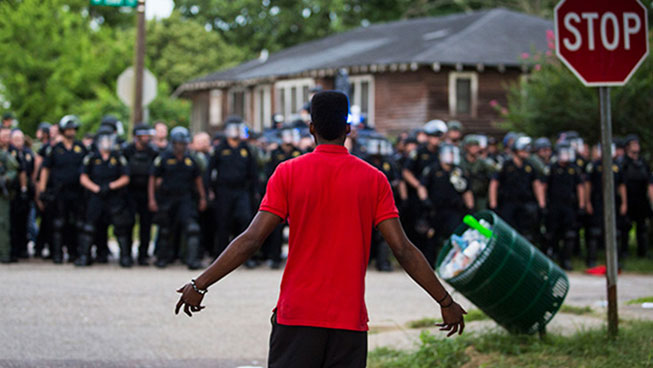
A protester faces a line of police officers in the days after the fatal police shooting of Alton Sterling in Baton Rouge, Louisiana, on July 10, 2016. (Photo: Edmund D. Fountain / The New York Times)
By Flint Taylor, Truthout
On the heels of the much ballyhooed meeting that an obsequious Donald Trump conducted this week with local law enforcement officials from across the country, the president titillated the gendarmes with a threat to destroy — COINTELPRO style — an unnamed Texas state senator rumored to be introducing legislation to prevent law enforcement from financing police operations by seizing arrestees’ property before they have been found guilty in a court of law. On Thursday, Trump followed up with an executive order that gave the recently confirmed Attorney General Jefferson Beauregard Sessions a carte blanche to bring down the wrath of the federal government on anyone who is unfortunate enough to have a confrontation with a cop, a prison guard, a border patrol officer or who knows who else outfitted with a badge and carrying a gun.
At first blush, the order could be seen simply as a wildly unpopular president playing macho man to our nation’s police departments and their reactionary police unions. The unions have been chafing over being curbed by the previous administration’s Department of Justice (DOJ), which, by means of pattern-or-practice investigations and consent decrees, started to put the brakes on racist police violence. On its face, Trump’s new order looks like much bluster, with no enforcement mechanisms. Many of the provisions will need to be passed by Congress, receive funding and ultimately, pass constitutional muster — a hurdle that the authoritarian Trump administration, with its white supremacist hatchet men at the helm, seems unwilling to pay even a trifling respect.
On further analysis, however, the order can be read as an official authorization, from one white supremacist — Steve Bannon — to another — Jeff Sessions — to pursue the most racist and reactionary criminal legal policies in recent memory. The overriding theme of the order is “to develop strategies led by the Department of Justice … to further enhance the protection and safety of Federal, state, tribal and local law enforcement officers.” What first comes to mind, quite intentionally, no doubt, are cops killed in the line of duty, the shooting in Dallas being the most prominent recent example. The policy statement — either explicitly or implicitly — appeals to fears about people of color and the demonization of Black Lives Matter (BLM), resonating with the barely coded racist refrains of “blue lives matter” and “law and order.”
Within the rubric of that declaration, and the details that follow in cold and calculating procession, the order, at bottom, takes aim at protesters, most urgently the Water Protectors at Standing Rock, BLM protesters across the nation, people protesting the Muslim ban and many others who practice acts of civil disobedience that bring them into conflict with law enforcement. Not content with local prosecutors dealing with these confrontations, this order encourages Sessions and his Department of Justice to find more punitive federal laws to charge protesters, to seek the passage of new federal laws to further aid this effort and to seek new mandatory minimum sentences to enhance the punishment of protesters, all under the guise of protecting law enforcement from “violence.”
Additionally, the order directs the Department of Justice to work with other federal agencies — no doubt the FBI, CIA and NSA prominent among them — to “develop an executive branch strategy to prevent violence against Federal, State, tribal, and local law enforcement officers.” As I typed those words, I had a chilling realization: This was the same rationale, and almost the exact same language, that the notorious J. Edgar Hoover used in his COINTELPRO directives that targeted Black liberation leaders Dr. Martin Luther King, Malcolm X, Stokely Carmichael (Kwame Ture), Fred Hampton and their organizations, and permitted wildly illegal government surveillance and orchestrated state violence during the 1960s.
The order also calls for the DOJ to evaluate “all grant funding programs currently administered by the DOJ to determine the extent to which its grant funding supports and protects” law enforcement and to seek legislation that would “adequately support and protect” these agencies. What seems apparent from these provisions is that funding for police reforms in training, discipline, monitoring and the like will be quashed, while funds for wartime armaments such as SWAT tanks, drones, high-powered weapons and sophisticated 21st-century surveillance will be the norm.
This order, like the similar legislation that the American Legislative Exchange Council is pushing on the state level, is designed to criminalize and quash dissent. Like the attack on the media, it is aimed at defeating, with broad authoritarian strokes, growing popular opposition to a wannabe neo-fascist regime. Wrapped in “law and order” and protecting the police, the next target after those who practice civil disobedience may well be the millions who have been taking to the streets.
Yet, clearly, executive repression will not signal the end of resistance. This battle will continue to be waged in the streets, in the media and in the courts. Our very existence depends on the outcome.
Flint Taylor has been litigating cases against police torture in Chicago for 30 years and is one of the lawyers for the families of slain Black Panther leaders Fred Hampton and Mark Clark. Together with his law partner Jeffrey Haas, Taylor was trial counsel in the marathon 1976 civil trial. For more information on the Hampton/Clark case, the history of the Black Panther Party and the FBI’s program to destroy it, visit PeoplesLawOffice.com.















